College of Swords Bard Build and Guide
Equipped with multiple weapons flourishes, Collge of Sword Bards is a great choice for anyone who wants to use weapons and abilities for damage rather than support.
Being able to use Bardic Inspiration to damage, stun, and or defend themself along with Extra Attack, College of Swords Bards can be menacing on any battlefield while also being great at dialogue.
In our College of Swords Bard build guide for Baldur’s Gate 3,we’ll dive into the subclass’s pros and cons, along with recommendations for every level 1-12.
Find out where the Bard ranks in our Baldur’s Gate 3 class tier list.
To learn how to play the Lore Bard, check our guide.
Pros and Cons
Pros
- Access to Medium Armor and Scmiters
- Multiple Attacks each turn with buffs
- Great out-of-combat utility
- Good multi-classing possibilities at later levels
Cons
- Many spells require Concentration
- Not as supportive as other Bard sub-classes
- Weapon Flourishes require Bardic Inspiration
- Not many new class features past lvl. 6
College of Swords Bards are a great mix of support and combat as they gain access to Weapon Flourishes and Medium Armor Proficiency.
They’re the only Bard subclass that gets Weapon Flourishes and Scimitar Proficiencies as well. Bardic Inspiration is one of the best Actions in Baldur’s Gate 3, as it can be used in either combat or exploration to gain the upper hand in a diverse selection of situations.
Because of their high Charisma, Bards provide players with a more dialogue-focused playthrough which is wonderful for uncovering the hidden lore of Faerûn.
Additionally, College of Swords Bards gain Jack of all Trades and Expertise Proficiencies, which just furthers their out-of-combat dialogue Proficiency Checks such as Persuasion, Deception, or Performance.
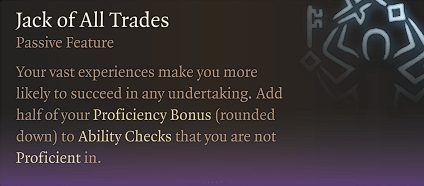
The main issues with College of Swords Bards are their Bardic Inspiration usage and their lack of buffed Bardic Inspiration. Weapon Flourishes require Bardic Inspiration to use, which forces College of Swords Bards to choose between using it to buff allies or perform their Weapon Actions.
College of Swords Bards also don’t gain buffed Bardic Inspiration. Valour Bards have access to Combat Inspiration and Lore Bards have Cutting Word, but Swords Bards don’t have anything like these two abilities.
Additionally, a decent amount of a College of Swords Bard’s spells require Concentration; however, characters can only concentrate on one spell at a time.
This requires you to be more strategic when thinking of spell placements so that you don’t waste your spell slots.
Races
When it comes to the best race for a Swords Bard, it’s almost completely up to personal preference. Zariel Tieflings gain access to the Thaumaturgy Cantrip, giving you a bonus to Intimidation and Performance ability checks. No other race has any Charisma bonuses or traits.
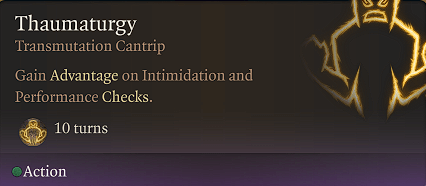
Because of this, I recommend either choosing this Tiefling subrace or just choosing any race you like personally and adding +2 in Charisma and +1 in Constitution under the Abilities tab.
Stats
A Bard’s highest Ability Score should be Charisma since it’s your abilities’ modifier. Your Constitution and Dexterity are also very important and should have the second most amount of Ability Points invested. Since you gain Medium Armor Proficiency at Level 3, having high Dexterity will help your early game skirmishes as well as increase your Armor Class (AC) by +2 when you wear Medium Armor.
Since you’ll also be using finesse weapons heavily as a College of Swords Bard, having high Dexterity will also allow you to do more damage. Constitution is also very important as it’ll increase your character’s max HP. Having a high Constitution score also helps you succeed in Constitution Saving Throws, and are very important for Bards as they have many Concentration abilities.
The rest of your points can be allocated as you wish, depending on what Skill Checks you’d like to pass. I recommend Wisdom so you can pass Insight Checks easily during dialogue, typically unlocking additional dialogue options. Your Ability Points can look something like this.
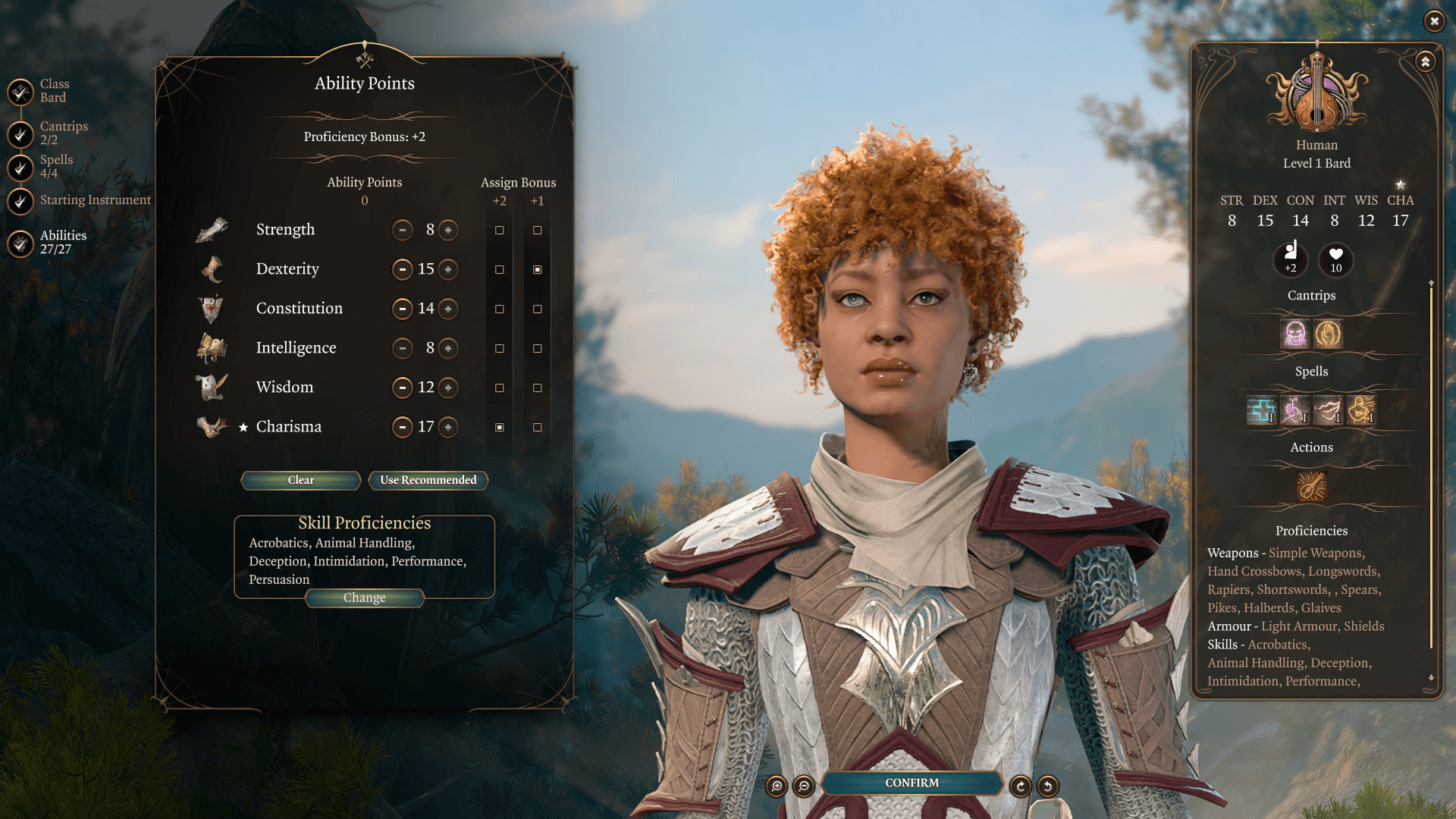
Backgrounds and Proficiencies
The most optimal Bard backgrounds are ones that provide Charisma skills.
Recommended backgrounds:
- Criminal: Deception and Stealth
- Entertainer: Acrobatics and Performance
- Guild Artisan: Insight and Persuasion
- Noble: History and Persuasion
- Soldier: Athletics and Intimidation
Depending on what Ability you choose to invest extra Ability Points into, you should choose a background that has its skill. For example, if you invested Ability Points into Intelligence, then it’s not a bad idea to select the Noble Background.
When choosing your skills, selecting anything that provides Charisma or Dexterity Skills will serve you well. I recommend choosing Persuasion, Insight, Performance, or Deception. You should choose your skills depending on what dialogue options you’d like to pick during the conversation.
You’ll also gain the option to choose your Musical Instrument. This is purely to determine the sound effects your abilities have and has no effect on actual attacks in combat, so just choose whichever one you like most. If the instrument you chose in the beginning is not to your liking, you can also find all the instruments while exploring or in certain shops.
Recommended Spells and Abilities
Even though College of Sword Bards is more reliant on their Weapon Flourishes and attacks, they’re still able to support and crowd control enemies effectively. Unlike other Bard sub-classes, Bardic Inspiration will be largely used to do your Weapon Flourishes and not support your allies.
Act 1
- Level 1
- Class Action: Bardic Inspiration
- Cantrip: Vicious Mockery
- Cantrip: Blade Ward/True Strike
- Bane
- Dissonant Whispers
- Healing Word
- Heroism
- Level 2
- Class Feature: Jack of All Trades
- Class Action: Song of Rest
- Faerie Fire, Tasha’s Hideous Laughter, or Thunderwave
- Level 3
- Expertise: Persuasion & Deception, Intimidation, or Performance
- Proficiencies: Scimitars & Medium Armor
- Blindness/Heat Metal
- Class Action: Slashing Flourish (Melee & Ranged)
- Class Action: Defensive Flourish (Melee & Ranged)
- Class Action: Mobile Flourish (Melee & Ranged)
- Fighting Style: Dueling
- Level 4
- Cantrip: Unselected Cantrip from Lv. 1
- Blindness/Hold Person
- Feat: Ability Improvement (CHR + DEX) or Defensive Duellist
- Level 5
- Class Feature: Font of Inspiration
- Class Feature: Improved Bardic Inspiration
- Glyph of Warding/Stinking Cloud
Level 1
At Level 1, you’ll gain Bardic Inspiration. This is an ability that gives any ally an added +1d6 bonus to their next Attack Roll, Ability Check, or Saving Throw. You can use Bardic Inspiration in combat or during dialogue. Unlike other Bard sub-classes, however, College of Sword Bards can also use Bardic Inspiration to perform their Weapon Flourishes in combat.
Weapon Flourishes are an extremely strong combat tool since you’re able to CC enemies or make yourself more tanky. Until Level 5, you can only replenish Bardic Inspiration with a Long Rest. This is why it’s very important to save your Bardic Inspiration for important battles or checks until you get more charges at later levels since it can turn the tides of battle easily, especially in Tactician mode.
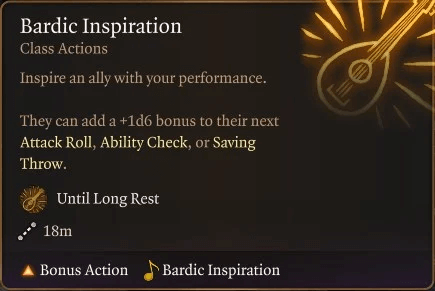
As you play and level up, you’ll gain access to many new Spells and Cantrips. However, like Sorcerers, you can’t Prepare Spells. This means you’ll learn a finite amount of spells throughout your playthrough. You must be selective in what spells you choose to learn since you won’t have access to every single Bard spell at any given time. Don’t stress though, as you can always talk to Withers to change out your spell list at any time.
For Level 1 spells, I recommend choosing Vicious Mockery and Blade Ward/True Strike as your Cantrips. Vicious Mockery does decent damage and can also give your enemy Disadvantage on their next attack roll, and since it’s a Cantrip, it doesn’t cost a spell slot.
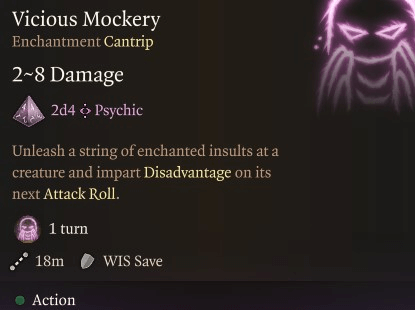
It’s a very strong option for pre-Level 3, and overall is a good option if you have no Bardic Inspiration or Spell Slots. Your next cantrip should be Blade Ward or True Strike. I personally recommend Blade Ward so you can be a bit more tanky before you gain Medium Armor proficiency.
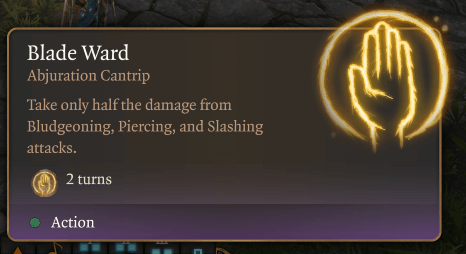
You can choose four Level 1 Spells in the character creator. I recommend the following load-out:
Level 1 Spells
- Bane: Bane up to 3 creatures, and making them receive a -1d4 penalty to Attack Rolls and Saving Throws. This spell is great for weakening strong enemies and making them less likely to hit you and your allies.
- Dissonant Whispers: Deal 3d6 Psychic damage and possibly Frighten a creature, making it easier to hit and unable to move. This spell does good damage and can also de-buff enemies significantly if they fail their Saving Throw.
- Healing Word: Heal any ally you can see within an 18m radius. You can revive and heal allies with this spell from a distance, and it’s a Bonus Action so you can still attack in the same turn.
- Heroism: Make yourself or a target immune to Frightened and gain 5 temporary hit points each turn. This spell is a really good early-game defensive option, as you can effectively gain 50HP if you’re getting hit for 5HP each turn and maintain your Concentration. It’s important to note that you can only have temporary hit points from one source, so you’ll only have 5 extra HP per turn.
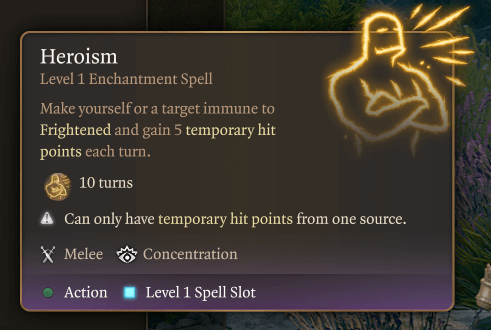
Tasha’s Hideous Laughter or Thunderwave are good options as well, but I prefer getting those spells at later levels.
Level 2
At Level 2, you gain access to Jack of All Trades, Song of Rest, and more Spells. Jack of All Trades just furthers your out-of-combat utility, as it lets you add half of your Proficiency Bonus to non-Proficient Skills checks. Song of Rest is basically just another Short Rest, which is a really good ability if you have a Warlock in your team or are playing Tactician difficulty.
You can also replace learned Spells and choose a new one. I suggest keeping the ones you picked in the Character Creator until Level 6 since the effects they provide are still useful in combat. For your new spell, I recommend choosing Faerie Fire, Tasha’s Hideous Laughter, or Thunderwave depending on your team comp.
Level 2 Spells
- Faerie Fire: Faerie Fire creates light in an AoE that causes anyone inside to turn visible. Any Attack Rolls against them will have an Advantage. Using this spell can really turn the tides of battle if you’re able to hit it on a large group of enemies. It’s important to know that allied units can be hit with this ability as well, so keep that in mind if your party’s rogue is attempting to flank enemy units as they will lose their advantage.
- Thunderwave: Release a wave of thunderous force that deals 2d8 Thunder damage and pushes away all creatures and objects. This spell does good damage and can also displace and create space from enemies who fail their Saving Throw.
- Tasha’s Hideous Laughter: Leave a creature Prone with laughter, without the ability to get up. This spell is great for getting Advantage for your allies and completely stopping an enemy’s movement and attacks.
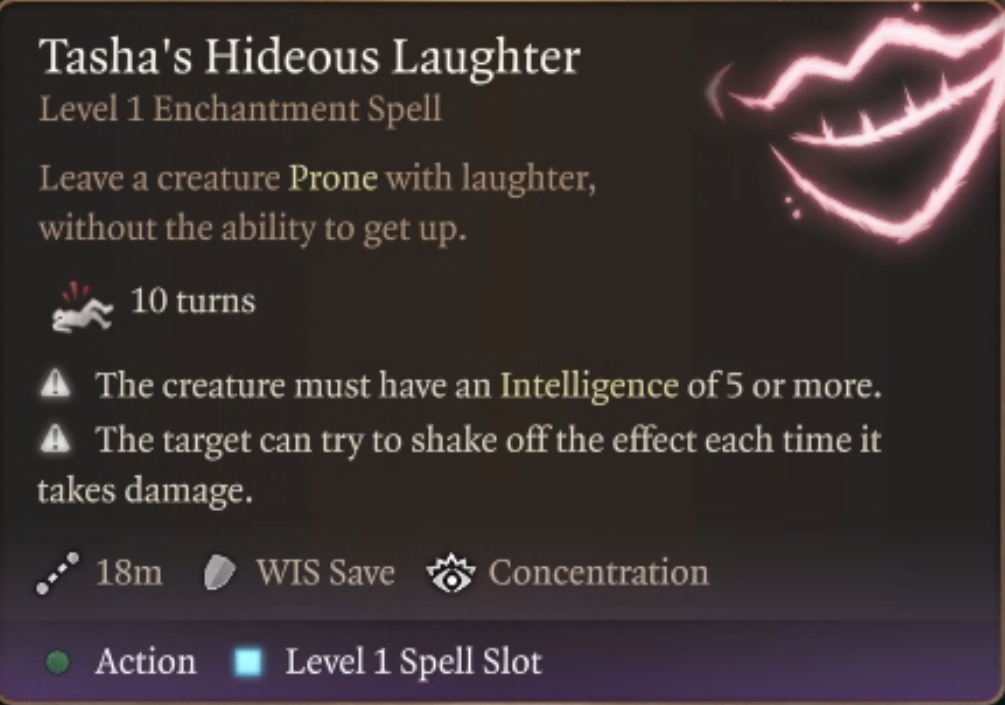
Level 3
When you reach Level 3, you’ll be able to pick your Bard subclass, choose your Skills with Expertise, and learn a Level 2 spell. College of Swords Bard grants you Medium Amour and Scimitar Proficiency, Weapon Flourishes, and a Fighting Style.
Weapon Flourishes are the main selling point of College of Swords Bards. Using a Bardic Inspiration slot and an Action, you’re able to use Slashing Flourish (attack up to 2 enemies at once), Defensive Flourish (increase your Armor Class by 4 if you hit your attack), and Mobile Flourish (push your target back 6m and are able to teleport to the target).
While these abilities are all very strong, they all do take Bardic Inspiration slots so it’s important to keep track of how many charges you have available during combat and decide if you want to use it on your allies or your attacks.
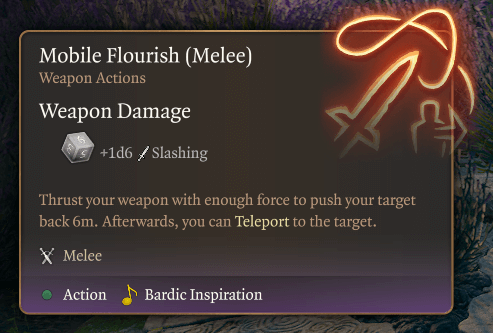
For Fighting Style, I recommend choosing Dueling over Two-Weapon Fighting since you’re unable to dual-wield rapiers.
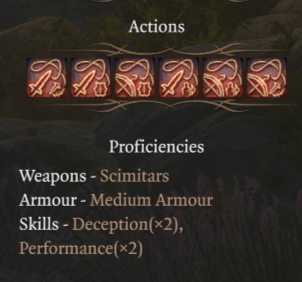
Unless you plan on choosing the Dual Wielder Feat at Level 4, which I don’t recommend since you get Extra Attack on College of Swords Bards and no extra Bonus Actions, then you should choose Dueling as your Fighting Style.
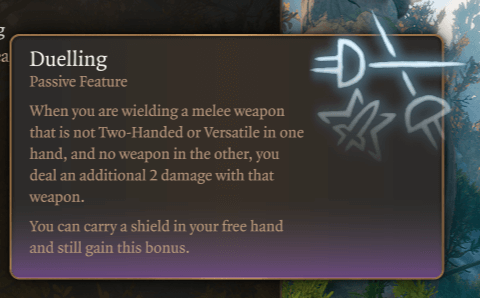
You’re also able to choose 2 skills with Expertise. Expertise is a class ability that allows you to double your Proficiency Bonus on a skill. I recommend choosing any Skill you notice you enjoy using so you’ll pass those checks more easily.
When choosing your new Level 2 Spell, there are many good options, and you should pick depending on your team comp and what you need. I recommend picking Heat Metal or Blindness. Heat Metal causes a metal weapon or armor to glow red-hot and force the creature touching it to let go or receive Disadvantage on Attack Rolls and Ability Checks.
This is a great ability to force enemies to drop their weapons or do damage over time. Blindness limits a foe’s sight range. It is easier to hit, and the creature will miss more often.
Attack Rolls against the affected enemy have an Advantage and the foe attacks with Disadvantage. This is another great support ability as you can lock down any difficult enemies and make it almost impossible for them to hit you.
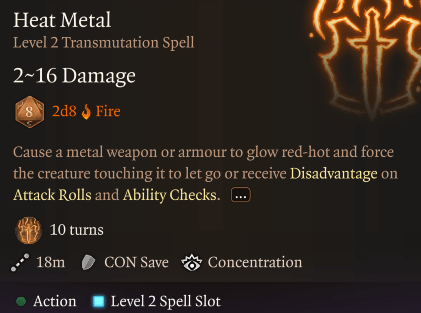
Level 4
Once you reach Level 4, you’ll be able to pick a Feat, an additional Level 2 spell, and a new Cantrip. I recommend picking Ability Improvement as your Feat so you can level up your Dexterity and Charisma to even numbers, which will only buff your spells and attacks. Alternatively, you can select Defensive Duelist to increase your AC and cause enemies to miss their attacks.
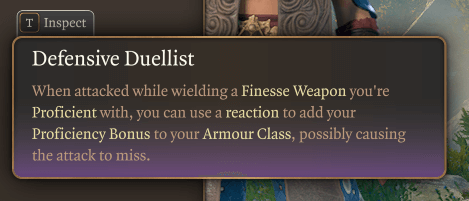
For your new Cantrip, choose the Cantrip you didn’t choose at Level 1. For example, if you picked True Strike then choose Blade Ward. Lastly, choose Blindness or Hold Person as your new spell.
Level 5
At Level 5, you’ll gain access to Font of Inspiration, Improved Bardic Inspiration, and a Level 3 Spell. Font of Inspiration allows you to gain back all Bardic Inspiration with a Short Rest.
This is good because you don’t have to waste Camp Supplies on a Long Rest to refill your charges, and you’re able to use your Weapon Flourishes more often. Improved Bardic Inspiration increases Bardic Inspiration skill check bonus to 1d8 from 1d6. For your new spell, I recommend taking Glyph of Warding or Stinking Cloud.
Glyph of Warding allows you to cast a giant circular glyph on the ground. If an enemy walks over it, then depending on the element of the glyph, different things can happen. This includes large AoE elemental damage, pushing enemies back, and putting enemies to Sleep.
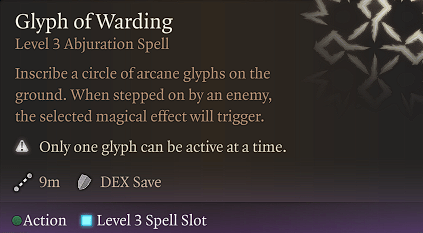
Allies can be hit by the AoE caused by enemies standing on the glyph, so be careful with positioning. Stinking Cloud makes a large AoE area that stops enemies from taking reactions. I enjoy Glyph of Warding more since it’s more versatile, but it’s ultimately up to personal preference.
At this point, your spellbook will look something like this:
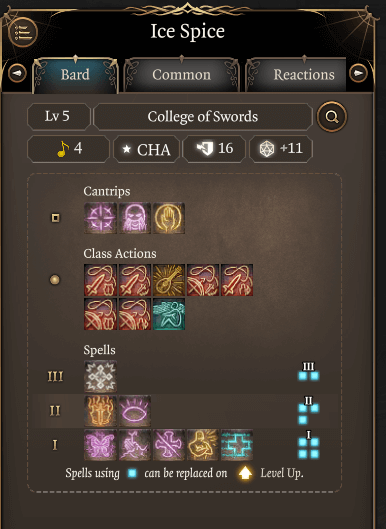
Acts 2-3
- Level 6
- Class Action: Countercharm
- Subclass Feature: Extra Attack
- Unselected spell from Lv. 5
- Swap: Dissonant Whispers -> Fear
- Level 7
- Freedom of Movement/Polymorph
- Swap: Bane -> Bestow Curse
- Level 8
- Confusion
- Feat: Ability Improvement (CHR)
- Level 9
- Dominate Person/Mass Cure Wounds
- Level 10
- Class Feature: Improved Bardic Inspiration
- Expertise: Unselected CHR Skills from Lv. 3
- Cantrip: Friends/Minor Illusion
- Hold Monster/Greater Restoration
- Magical Secrets: Fire Shield, Counterspell, or Spirit Guardians
- Level 11
- Eyebite or Otto’s Irresistible Dance
- Level 12
- Feat: Ability Improvement (DEX), Sentinel, or Mobile
Levels 6-7
At Levels 6 and 7, you gain the Bard Class Feature: Countercharm. You also gain Extra Attack, and a new Level 3 and 4 Spell Slot. We’ll also begin to swap out older spells at this point.
Countercharm is an Action that provides all allies within 9m an advantage on Saving Throws against being Charmed and Frightened. This Action can be good against any enemies with CC spells. Extra Attack lets you make two attacks in one turn, which greatly increases your damage output.
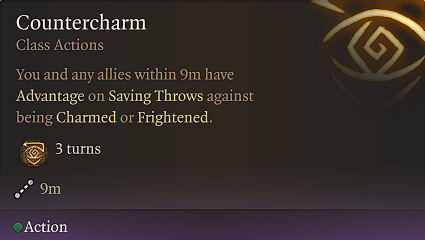
For your new spells, I recommend picking from the following depending on what you chose before and what team comp you have.
Best Level 3 Spells:
- Glyph of Warding: Creates a large AoE on the ground that, when stepped on by an enemy, causes the selected magical effect to trigger. As explained before, this spell has a lot of utility in combat and can be placed preemptively as well. It can be used to either zone enemies or deal damage, making it incredibly versatile.
- Stinking Cloud: This creates an area where no creatures caught inside can take any actions. This is a really good supportive spell that covers a lot of area and can buy your team time to recover or prepare.
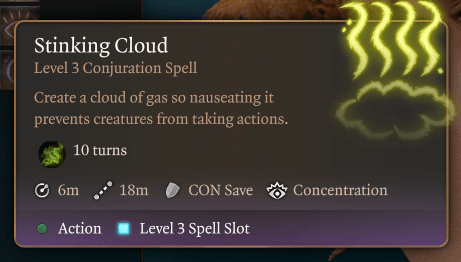
- Level 6 Swap: Dissonant Whispers -> Fear: Makes targets drop their weapons and become Fearful. They will be easier to hit and cannot move. Fear is the buffed-up version of Dissonant Whispers, and when you’re at this point in the game you’ll have enough spell slots to support using it.
- Level 7 Swap: Bane -> Bestow Curse: Touch a creature to give them Disadvantage on checks and Saving Throws or attacks. This lets you deal additional damage to the target, or rob it of its actions. Bestow Curse is the better version of Bane. Both Bane and Bestow Curse require Concentration, so there’s no point in having both in your spellbook.
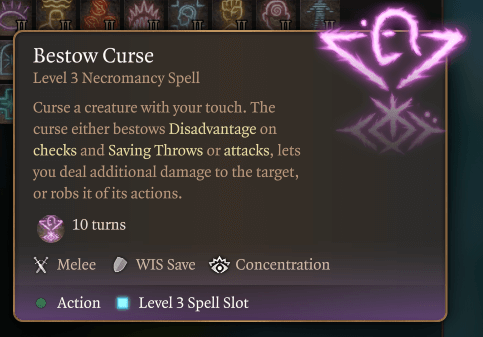
Best Level 4 Spells:
- Freedom of Movement: Prevents your allies from being affected by most Crowd Control effects. Difficult Terrain can’t slow them down, and they can’t be magically Paralyzed or Restrained. If the target is Restrained by non-magical means, it can spend 1.5m of movement to free itself. This is one of the best supportive spells in the game as you can effectively make the enemy’s crowd control obsolete. In Act 2, there are many sections with vines that can root your allies so this spell will be handy during those sections.
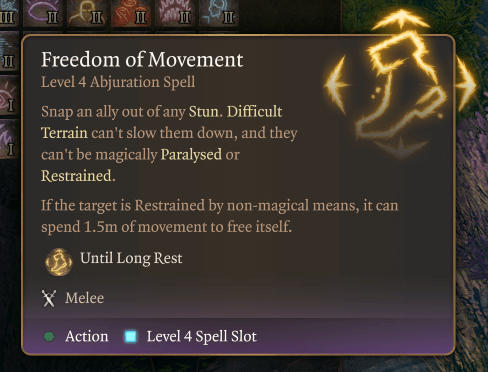
- Polymorph: Transform a creature into a sheep. If the sheep’s hit points drop to 0, the target reverts to its original form with its original hit points. This is a great single-target CC ability and you’ll be able to effectively render any single enemy useless during a fight, allowing you to shift your focus to other opponents.
Levels 8-9
Once you reach Levels 8 and 9, you’ll gain a new Feat and new Level 4 and 5 Spell. I recommend picking Ability Improvement so you can raise your Charisma to 18 or 20 (depending on your last chosen Feat).
For your new spells, I suggest choosing Confusion and Dominate Person/Mass Cure Wounds. While Mass Cure Wounds is the best healing spell in the game, if you have a Cleric, Druid, or different sub-class Bard in your party then it’d be better for them to have it and for you to take Dominate Person.
Level 4 Spells
- Confusion: Befuddle a group of creatures, causing them to attack at random, wander around aimlessly, and occasionally skip turns in the stupor. This spell is amazing since it’s such a good CC spell that targets multiple enemies in a wide area.
Level 5 Spells
- Dominate Person: Make a humanoid fight alongside you. Every time the creature takes damage, it makes a Wisdom Saving Throw against your domination. This spell allows you to make any humanoid creature fight as if they were an ally, including bosses. Important note as of Patch #3, dominated enemies have a bug where they’ll attack themselves and possibly break the domination.
- Mass Cure Wounds: Unleash a soothing hum of energy that heals you and nearby allies for 3d8+4 healing. It’s the best healing spell in the game, the range is huge and it heals a lot for multiple allies.
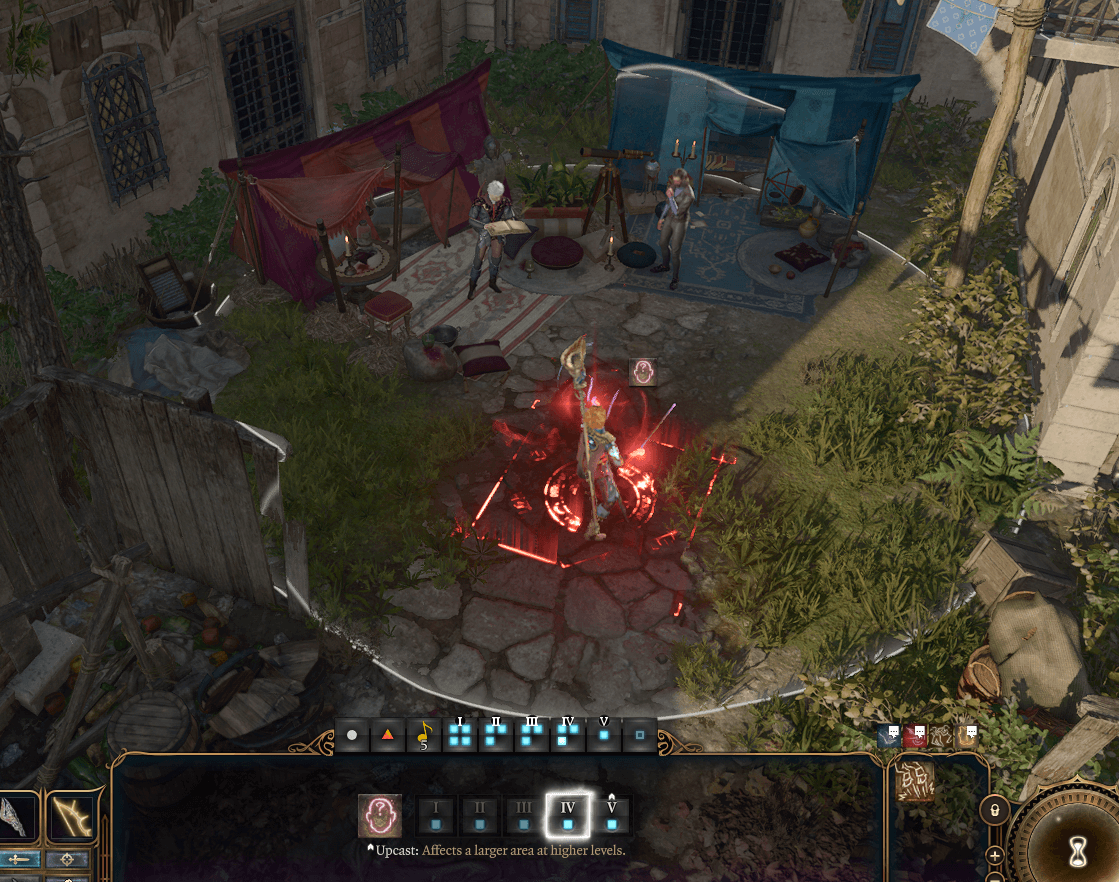
Level 10
At Level 10, you’ll gain a new Cantrip, Skill Proficiencies, Improved Bardic Inspiration, Magical Secrets, and a new Level 5 Spell. Skill Proficiencies let you gain a +4 in 2 Skills of your choosing. This means you could have a +13 to 2 Skills if you chose them to have Expertise before. Improved Bardic Inspiration increases your Bardic Inspiration bonus from +1d8 to +1d10.
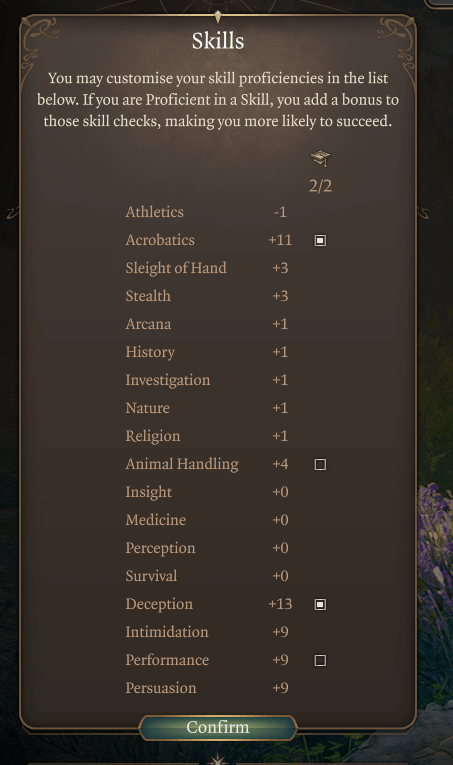
- New Cantrip
- Friends: Gain Advantage on Charisma Checks against a non-hostile creature. In higher difficulty modes, the target might accuse you of enchanting them, and if you use it on a party member, you can lose their approval. While you’ll most likely have a +8 to +13 to Charisma dialogue checks, if there’s ever a really difficult roll it’s not a bad idea to use it.
- Minor Illusion: Create an illusion that compels nearby creatures to investigate. Additionally, you can remain hidden while casting this spell. This is a good Cantrip for stealth and is generally good to have.
Magical Secrets allows you to choose two spells from any other spellcasting class and cast them with a Charisma modifier. While there are many good options to choose from, and if you have any you personally really like then choose those, but these are my personal favorites.
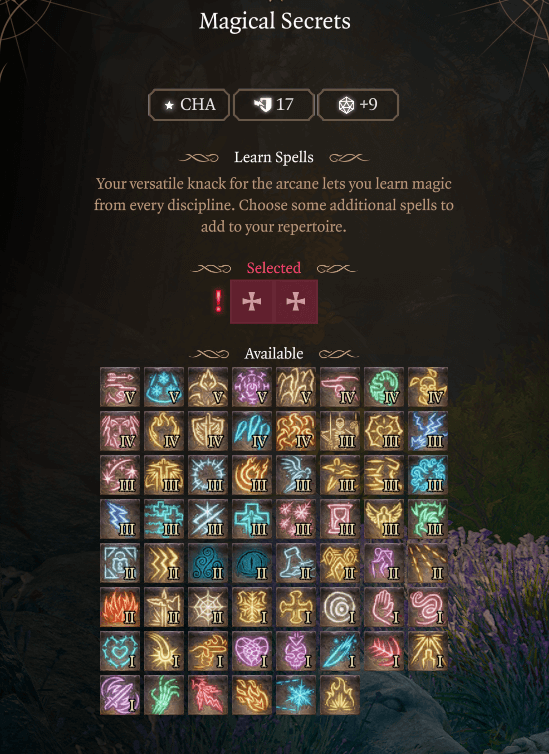
- Magical Secrets
- Counterspell: Nullify another creature’s spell as a reaction. The spell must be 3rd level or lower. If it is higher, you must succeed a Check to nullify it. One of the best spells in the game, you’re able to stop almost any spell from hitting you or your allies. Choose this spell if you don’t have any spellcasters in your party who can cast it, or if you’d just like to cast it more often during combat.
- Fireshield: Wreath your body in flames that shed light in a 3m radius, provide Resistance to Fire or Cold damage, and retaliate against melee attacks. This is a great spell for College of Sword Bards as you’ll be melee attacking often. I recommend always choosing this as one of your Magical Secrets Spells as it increases your damage output. It also doesn’t take Concentration.
- Spirit Guardians: Call forth spirits to protect the area around you. Nearby enemies take 3~24 Radiant damage or 3~24 Necrotic damage per turn, and their movement speed is halved. One of the best Cleric spells, you’ll be able to deal damage by just standing next to enemies. The only drawback is that it requires Concentration, but I think it’s still worth picking up. You’re also able to have Spirit Guardians and Fireshield active at the same time since only Spirit Guardians require Concentration.
Level 5 Spells
- Hold Monster: Paralyze a creature. It can’t move, act, or react. Attacks from within 3m are always Critical Hits. This is just a better version of Hold Person as you can paralyze any enemy you find, they don’t need to be humanoid. If you have Hold Person and you want this spell, then switch out Hold Person for a previously mentioned Level 3/4 Spell when you level up.
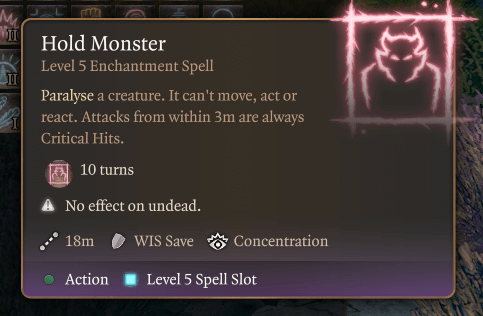
- Greater Restoration: Touch a creature and negate any Charm, Petrification, Stun, or curse afflicting it. A great cleanse spell that can negate any combat CC, it’s always a good spell to have in your spellbook. It’s important to note that Greater Restoration does not work on permanent ability score reductions from story/dialogue choices (looking at you, Gith Crèche).
Level 11-12
At Levels 11 and 12, you’ll gain a Level 6 Spell and your final Feat. For your Feat, you can choose Ability Improvement to raise your Dexterity or Charisma higher. If you’re tired of choosing Ability Improvement, however, then other great choices are Sentinel or Mobile.
Level 11 Feats
- Sentinel: When an enemy within melee range attacks an ally, you can use a reaction to make a weapon attack against that enemy. You gain Advantage on Opportunity Attacks, and when you hit a creature with an Opportunity Attack, it can no longer move for the rest of its tum. A really good Feat for dealing more damage when it’s not your turn and limiting enemy movement.
- Mobile: Your movement speed increases and difficult terrain doesn’t slow you down when you Dash. If you move after making a melee attack, you don’t provoke Opportunity Attacks from your target. While the movement speed increase is good, the main reason for choosing this Feat is to not provoke Opportunity Attacks. This allows you to reposition easily and without consequence.
My favorite Level 6 Spell is Eyebite. Eyebite allows you to inflict dread, sickness, or put creatures to sleep. While Concentrating on Eyebite, you may cast Eyebite without expending a spell slot. Another popular choice is Otto’s Irresistible Dance which causes a creature to start dancing, making it unable to take actions or move and attackers have Advantage on Attack Rolls against the target.
I personally think Eyebite is the better spell option as you have access to Hold Monster or Polymorph as single-target CC options, but Otto’s Irresistible Dance is certainly the more amusing option.
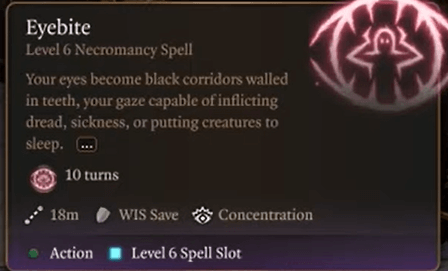
Equipment
For equipment, I recommend picking any rapiers or scimitars with bonuses. This will maximize your damage as both are Finesse weapons. A good early-game weapon option is the Speedy Reply, which is found in the Risen Road. You should also equip a longbow, as your Dexterity is enough to do decent ranged damage and you can do ranged Weapon Flourishes.
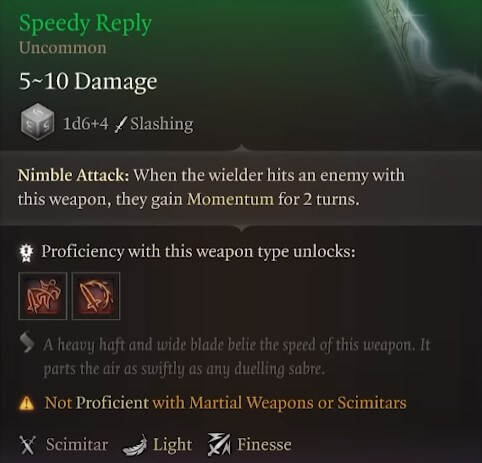
The best armor for College of Swords Bards is Medium Armor due to your Proficiency. Wearing Medium Armor will increase your AC and make you harder to kill. For early-game armor, I recommend Scale Mail or the Githyanki Half Plate. You can find Scale Mail being sold by merchants or on corpses, and Githyanki Half Plates can be found on dead Githyanki or by permanently borrowing Lae’zel’s.
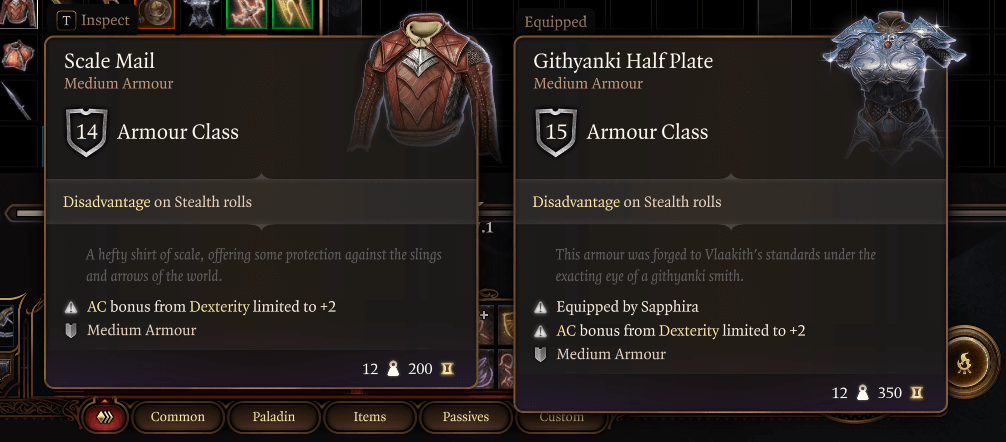
I recommend wearing the Cap of Curing early on since Bards are the only class that can make use of its benefits. If you use Bardic Inspiration on an ally while wearing this hat, the target will gain 1d6 HP. This hat is found in a Gilded Chest near the Druid Grove, next to the Bard NPC, Alfira. The Wondrous Gloves, dropped by a Mimic in the Grymforge, provide you with an additional charge of Bardic Inspiration.
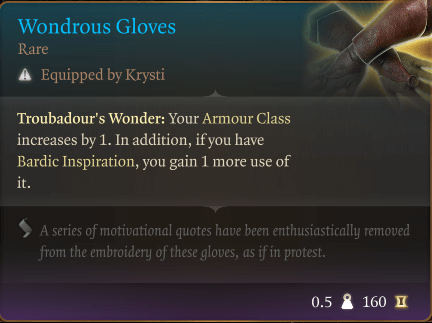
However, once you get into Act II or III it isn’t a bad idea to switch out your gear. Some items I would recommend are as follows:
- Armor of Agility: Sold by Gloomy Fentonson at Stormshore Armoury.
- Yuan-Ti Scale Mail: Sold by Quartermaster Talliin in Last Light Inn.
- Unwanted Masterwork Scalemail: Sold by Dammon at Forge of the Nine, Lower City.
- Elven Chain: Sold by Exxvikyap at the Rivington General.
- Cindermoth Cloak: Dropped by Aelis Siryasius in Lower City Sewers.
- Vivacious Cloak: In a chest at Grand Mausoleum.
- Boots of Brilliance: Found in a chest in the Gauntlet of Shar near Yurgir.
- The Pointy Hat: Found in a locked chest in a tent near Lucretious at the Circus of the Last Days.
- Killer’s Sweetheart: Found in the Gauntlet of Shar during the Self-Same Trial.
- Infernal Rapier: Rewarded by Mizora after rescuing her in Moonrise Towers
- Duelist’s Prerogative: Rewarded by Flaming Fist after completing the Save Vanra quest.
The Armor of Agility is Medium Armor that you can buy for 2900 gold. It has the ability, Exotic Material, which adds your Dexterity modifier to your AC, allowing you to be better in combat overall since the College of Swords Bard is the most combat/frontline-oriented Bard subclass.
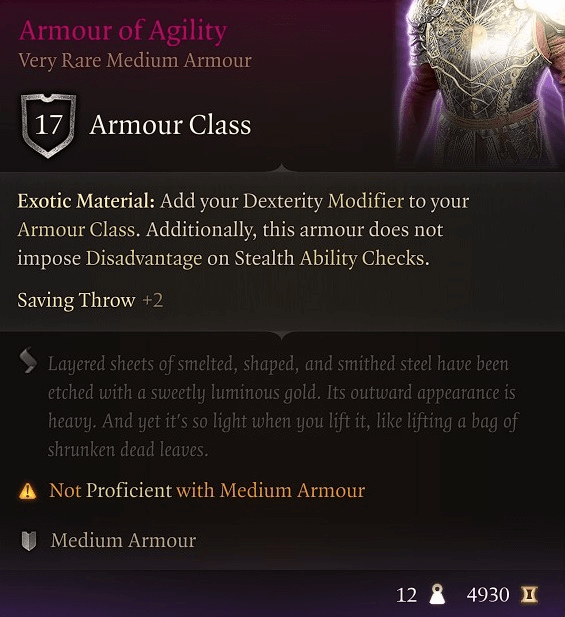
Additionally, you will likely have decent Dexterity, meaning that you will be able to take advantage of this bonus. As an added benefit, the armor gives you +2 to Saving Throws and does not provide you with Disadvantage on Stealth Checks.
Yuan-Ti Scale Mail can be purchased for 704 gold and also has the Exotic Material stat, adding your Dexterity modifier to your AC and negating the Disadvantage on Stealth Checks. While wearing it, you’ll also gain a +1 bonus to Initiative Rolls.
Another set of Medium Armor that boasts the Exotic Material effect is the Unwanted Masterwork Scalemail that you can purchase for 640 gold. This set will also provide you with fire resistance.
Elven Chain is an alternative armor set that is much cheaper than the previous options at only 510 gold! It gives the wearer automatic Proficiency while wearing it (which you don’t really need since you already have Medium Armor Proficiency, but it’s good to know for other classes).
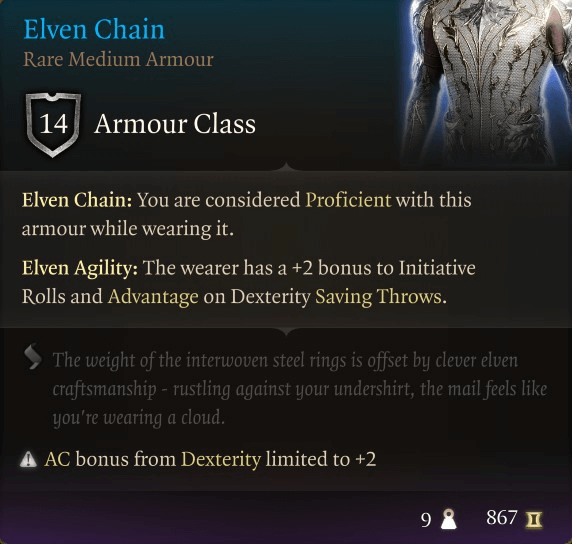
Its other benefit is Elven Agility, which provides the wearer with a +2 bonus to Initiative Rolls and Advantage on Dexterity Saving Throws, letting you start your turn earlier.
The Cindermoth Cloak can be obtained for the low price of free in the Baulder’s Gate Sewers! This cloak causes any creature that causes damage to the wearer to start burning (provided that they are within 2m).
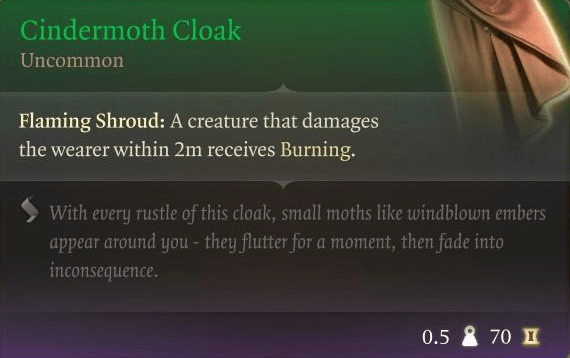
The Vivacious Cloak is also free and grants the wearer 7 temporary hit points if they cast a spell within melee range of an enemy creature. This essentially equates to a free use of the spell, False Life, a spell that Bards are unable to wield without the aid of Magical Secrets, so having this cloak is helpful.
The Boots of Brilliance are a set of boots that provide the wearer with the Class Action: Restore Bardic Inspiration which allows you to, you guessed it, restore charges of Bardic Inspiration both in and out of combat. Since you’ll be using your Bardic Inspiration a lot, it’s a good idea to hold onto these.
The Pointy Hat is a hat you have to steal from Lucretious’ locked chest (yet another task you can force Astarion to do). While Intelligence isn’t the most useful skill for a Bard, this hat adds your Intelligence Modifier to your Persuasion Checks. This is useful for gaining an extra edge during dialogue, or just for bragging about being able to crack 35 on a Persuasion Check.
Killer’s Sweetheart is a ring that, once per Long Rest, allows you to use a Reaction after killing a creature to turn your next attack into a Critical Hit.
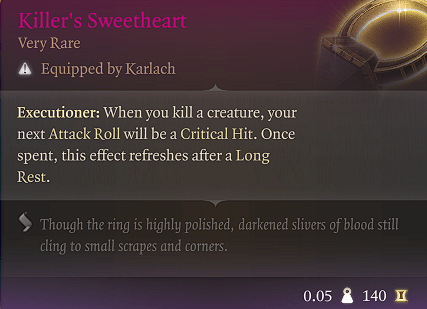
This is useful because Critical Hits are actually capable of higher damage output when compared with a normal attack! Yes, really!
Likely one of the most useful weapons in the game, the Infernal Rapier, granted by Mizora after not killing her and passing a DC 14 Persuasion Check, provides many useful effects to its wielder.
First off, you will gain a +1 bonus to Spell Saves, giving you a higher chance of negating the effects of harmful spells. It also adds your Spellcasting Modifier to your Attack Rolls instead of using your Dexterity, meaning that the higher your Charisma is, the more damage you’ll deal with attacks. Finally, you will gain the ability to summon a Cambion to join you in battle, or even as a buddy while exploring, without spending a spell slot.
Finally, once you complete the mission, Save Vanra, you will be granted the Duelist’s Prerogative, a legendary rapier that can provide you with many bonuses and abilities. The first benefit you are granted is the Elegant Duellist perk which allows you to roll a Critical Hit if you roll 19, provided that your off-hand is empty.
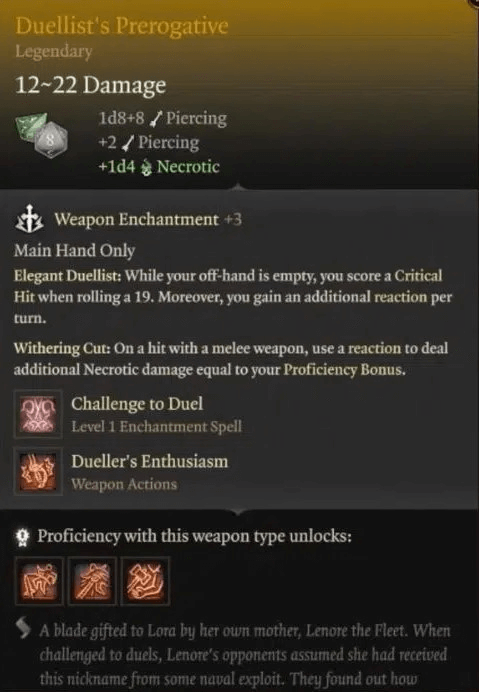
This will stack with your Fighting Style if you previously chose Duelling, allowing you to deal even more damage per hit. This ability also gives you an additional reaction per turn, which you can use with the weapon’s other ability, Withering Cut, allowing you to use a reaction to deal Necrotic Damage equal to your Proficiency Bonus after you hit a creature with a melee weapon. Duelist’s Prerogative will also allow you to use the abilities Challenge to Duel and Dueller’s Enthusiasm.
Challenge to Duel is an ability that can be used as a Bonus Action to cause an enemy to focus on only attacking the caster. It will also cause the target to bleed, dealing 2 Slashing damage each turn and giving them Disadvantage on Constitution Saving Throws.
The affected target has to pass a Wisdom Saving Throw in order to negate the ability’s taunt. Dueller’s Enthusiasm is a Weapon Action that allows the user to make an additional melee attack as long as they aren’t dual wielding.
In Conclusion
College of Sword Bard is a great choice for anyone interested in dealing consistent damage with high rizz. Equipped with Medium Armor Proficiency and different Weapon Flourishes and spells, you can rely on this class to be a great damage dealer and a good supportive member of any team.
 Download APP
Download APP